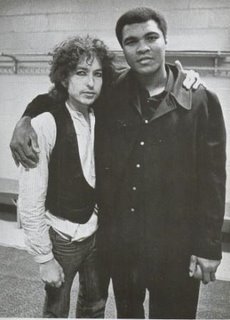
photo by Ken Regan
Tomorrow - Jan 17 - is the great Muhammad Ali's 65th birthday. Here is the entry on him in The Bob Dylan Encyclopedia:
Cassius Marcellus Clay Jr. was born in Louisville, Kentucky, on January 17, 1942. He grew up to be one of the greatest athletes in history: a boxer so talented, handsome and lithe that he made a whole generation of people who didn’t like boxing watch the sport; a pioneering African-American celebrity who, in the Civil Rights era, lent his name to the cause by changing it, from Cassius Clay to Muhammad Ali - throwing off the heritage of slavery at the height of his initial fame, and so scandalising the forces of reaction in white America; a commoner who refused to bow down before the machine - refusing to fight in the unjust war in Vietnam and facing gaol, death threats and persecution instead; an intelligent, witty, charming, immensely gifted man who brought a new style of outrageous boastfulness, undercut by sly self-mockery, to the promotion of his fights and the discomfiture of his opponents, and who ran rings around the standard expectation that, well, OK, you could escape the ghetto by becoming a fighter but only if you minded your ps & qs and played by a set of rules stacked high against you.
In ‘I Shall Be Free No.10’ on Another Side Of Bob Dylan in 1964, Dylan gives him a playful namecheck as Cassius Clay - the name under which he was a Gold Medallist at the Rome Olympics of 1960, only to return to a segregated Louisville that failed to welcome him home as an American hero; the name under which he won his next 19 fights, 15 by knockouts; under which the brash 22-year-old knocked out the supposedly invincible Sonny Liston in the seventh round on February 25, 1964.
Dylan’s song, recorded on June 9 the same year, says this: ‘I was shadow-boxing earlier in the day / I figured I was ready for Cassius Clay / I said “Fee, fie, fo, fum, / Cassius Clay, here I come / 26, 27, 28, 29, I’m gonna make your face look just like mine / 5, 4, 3, 2, 1, Cassius Clay you’d better run / 99, 100, 101, 102, your ma won’t even recognize you / 14, 15, 16, 17, 18, 19, gonna knock him clean right out of his spleen.”’
Clay announced his conversion to Islam and his taking of the name Muhammad Ali shortly afterwards. His title was revoked in 1967 when, citing his faith, he refused induction into the US military and was fined $10,000 and sentenced to a five-year prison term (which he didn’t, in the end, have to serve). The US Supreme Court did not officially reverse his conviction for draft evasion until 1971 but Ali resumed fighting in 1970, knocking out Jerry Quarry and Oscar Bonaven to earn a chance to regain his heavyweight crown. On March 8, 1971, Ali suffered the first loss of his career, losing to Joe Frazier in 15 rounds, but regained the heavyweight championship on October 30, 1974, in Kinshasa, Zaire (now the so-called Democratic Republic of the Congo), knocking out George Foreman in ‘the rumble in the jungle’. Ali defended his title ten times in the following four years, including victory over Joe Frazier in 1975 in the Philippines. In 1977 he played himself in a competent bio-pic based on his own book, The Greatest. He lost his crown again to Leon Spinks in Las Vegas in early 1978 but, unbelievably, regained it one more time that September at their rematch in New Orleans. He was the only fighter to ever win the heavyweight crown three times. He announced his retirement from boxing in June 1979, but within a year challenged champion Larry Holmes for the crown. On October 2, 1980, in Las Vegas, Nevada, Ali suffered the worst, most punishing loss of his career. Ali retired permanently at the end of 1981.
When he was reigning heavyweight champion of the world, he appeared at Bob Dylan’s fundraising benefit concert for RUBIN ‘HURRICANE’ CARTER at the end of the first Rolling Thunder Revue, at Madison Square Garden, New York City, on December 8, 1975: the ‘Night of the Hurricane’. Addressing the overwhelmingly white crowd, Ali declared: ‘You’ve got the connections, and the complexion, to get the protection!’ Backstage, Ali and Dylan posed together for photographer KEN REGAN, for what turned out to include an utterly charming, evocative, funny, touching picture of the two, standing like brothers in arms, looking right into the camera.
MIKE MARQUSEE’s book Redemption Song: Muhammad Ali and the Spirit of the Sixties makes articulate and telling comparisons between the two figures, who are a mere eight months apart in age.
[Michael Marqusee: Redemption Song (London: Verso, 1999)]
He shook up the world!
ReplyDelete